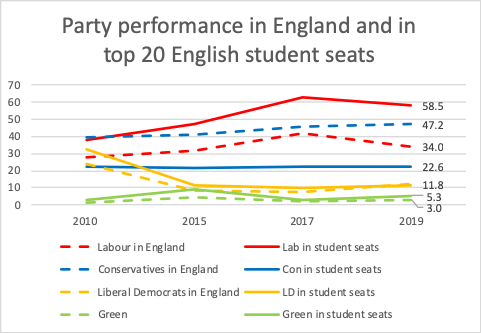Student voters in the General Election: How much difference did they really make?

New @HEPI_news report inspects the impact of students voters at recent general elections @Conservatives, @UKLabour & @LibDems
The Higher Education Policy Institute has published a new report on student voters at the last four UK general elections (2010, 2015, 2017 and 2019).
At the 2019 General Election, Labour’s vote share was 25 percentage points higher in student constituencies – and the Conservatives’ vote share was 25 percentage points lower .
Student voters – Did they make a difference? (HEPI Report 133) by Nick Hillman focuses on the results in the 25 parliamentary constituencies in England, Scotland and Wales with the most students and compares them to the overall picture.
Nick Hillman, Director of HEPI and the author of the report, said:
‘There was lots of chatter before the 2019 election about whether students would vote, where they would vote and how they would vote. So we have assessed whether they made a difference.
‘Our research confirms that student seats lean left, though perhaps to an even greater degree than previously thought. In constituencies in England with lots of students, Labour scored 25 percentage points more, while the Conservatives scored 25 percentage points less. The student vote has proved decisive in seats like Portsmouth South, Leeds North West, Canterbury and Coventry South. Labour also outperform the Conservatives in student seats in Wales and Scotland, though it is the SNP that tends to win in student areas in Scotland.
‘Our research highlights some common fallacies. For example, minor parties, such as the Green Party, have not generally done particularly well in student seats. Moreover, the common idea that the voice of students will be louder if they vote at their term-time address rather than their home address is often wrong – as students can sometimes just help stack up even bigger majorities in safe seats. While the Liberal Democrats struggled to maintain their previous performance after entering Government in 2010, they continued to do better in seats with lots of students than in England as a whole until 2019.
‘As the new academic year begins, I urge students who move away to study to keep their options open by making sure they are registered to vote in their place of study as well as at their home address. I would also urge policymakers not to take the student vote for granted. While students are interested in so-called “student issues”, such as student finance, they are also motivated by other issues, such as climate change, the state of the NHS and the UK’s place in the world.
‘We also all need to avoid the simplistic assumption that going to university makes people left-wing, as this idea is increasingly being challenged by academics with hard evidence.’
NUS responds to HEPI report on students’ massive impact in 2019 General ElectionThis report from the Higher Education Policy Institute has revealed that students had a significant impact at the 2019 General Election. The report confirms many things that NUS have previously asserted including:
The report comes at an important time as students prepare to organise around key issues for the 2021 May local elections and national elections in Wales and Scotland.
“We know that students and young people are hungry for change. We’re the generation that have grown up under austerity, the climate crisis, Brexit, and now Covid-19. Recent UK Governments have categorically failed students and young people “In the 2019 General Election students took part in a massive student vote operation led by NUS and Students’ Unions. Our goals were to register students, inform them, and get out to vote on polling day in record numbers. Top issues for students in 2019 were a fully funded education system, radical action on climate crisis, affordable housing, quality jobs and an end to racist immigration policies. We know our votes made real difference in key seats across the UK. “In NUS’ most recent survey of students, 67% don’t feel that the UK Government are acting in their interests during the pandemic. The government still have time to turn this around and make a difference for students and young people but it will require decisive action now. Students want to see an end to racist dog whistling around immigration and a decent deal to end the Brexit debacle. “Students need to see urgent radical action on the climate. And students want to see the government finally end the failed experiment of marketisation in education and invest in a lifelong accessible and funded education system that benefits our society. Students’ views are clear and if political parties don’t listen, they risk losing the support of this generation for ever.” |

Recent cohorts of students have shown a strong preference for Labour. At recent elections, Labour have stacked up votes in many of the seats in which students are most concentrated. After the 2017 election, it was claimed that Labour had lost the election for want of just another couple of thousand votes in the most marginal seats. Yet in many student-heavy seats, Labour have recently stacked up majorities of well over 20,000.
When Boris Johnson fixed the last election to take place on 12 December 2019, it was widely claimed that university term dates would mean many students would not vote at their place of study and that this would unfairly benefit the Conservatives.
The New Statesman described ‘a particularly ineradicable meme that the reason why the election date matters is because it will change whether the election falls in term time’
Key points:
In England, Labour have done much better in constituencies with lots of students than they have done overall and the Conservatives have done considerably worse. In both instances, the gap has been growing at every recent election. In 2019, Labour’s share of the vote was 25 percentage points higher in English student seats than in England as a whole (compared to 11 percentage points in 2010) while the Conservatives’ vote share was 25 percentage points lower (compared to 17% in 2010).
In Wales, Labour also do better in student seats while the Conservatives do worse: Labour’s additional vote share in the two Welsh student seats included in the study was 16 percentage points in 2019, while the Conservatives won 12 percentage points less in Welsh student seats than in Wales as a whole.
In Scotland, Labour did worse overall than the Conservatives in 2017 and 2019 but they continued to beat the Conservatives by a considerable margin in student seats. However, the Scottish National Party’s overall dominance in Scotland means the SNP are the main beneficiaries of recent electoral trends and they have won decisive victories in student seats at the last three elections.
The Liberal Democrats were relatively successful in winning the votes of students in 2010, winning five of the 20 student seats in England and one of the two in Wales (but none of the three in Scotland). However, the Liberal Democrat vote share fell heavily afterwards and, by 2019, they were performing slightly worse in English student seats than in England as a whole.
In many seats with the most students, Labour’s majority is very large – for example, it is over 78%, or over 37,000 votes, in Liverpool Riverside. So students often seem to increase the winning candidate’s majority rather than change the result. Depending on individual circumstances, they may sometimes have had more impact had they opted to vote in their home constituencies rather than their term-time ones.
Of the 100 election results in the 25 student seats across the whole UK between 2010 and 2019, Labour’s tally is 78 wins, compared to nine for the Liberal Democrats and just four for the Conservatives. The SNP won nine times (out of a possible maximum of 12 in the four Scottish seats covered in the study).
Minor parties have tended to perform poorly in student seats at recent elections, with no smaller party winning a student seat at any of the last four general elections. The perception that the Green Party does particularly well among students is not supported by recent general election results, although this may – in part – reflect tactical voting under the first-past-the-post electoral system (and Brighton Pavilion, which is held by a Green MP, is just outside the top 25 student seats included in this study). On the other hand, the perception that UKIP and the Brexit Party have earned little support from students is supported by the data, while Plaid Cymru have tended to do worse in Welsh student seats than other Welsh seats.
While the electoral importance of student issues is sometimes exaggerated, the student vote cannot be taken for granted and will continue to make a difference in some key seats. Indeed, if higher education continues on its long-term trajectory of welcoming more full-time students, the concept of an identifiable student vote could conceivably grow.
There are well-publicised claims that the process of attending university can alter students’ political viewpoints, in particular by pushing them to the left of the political spectrum. Yet while most UK students (and higher education staff) do seem to gravitate towards left-of-centre parties, there is also evidence to suggest attending higher education may determine people’s political outlook less than is often supposed.

 Responding to the details of the report, Larissa Kennedy, NUS President, said:
Responding to the details of the report, Larissa Kennedy, NUS President, said:
Responses